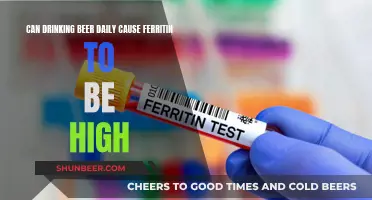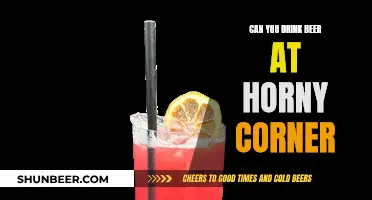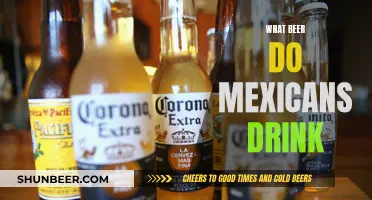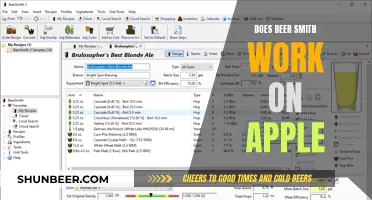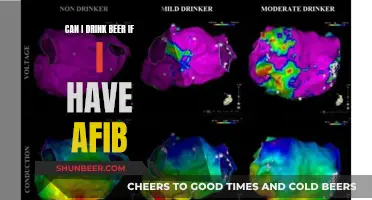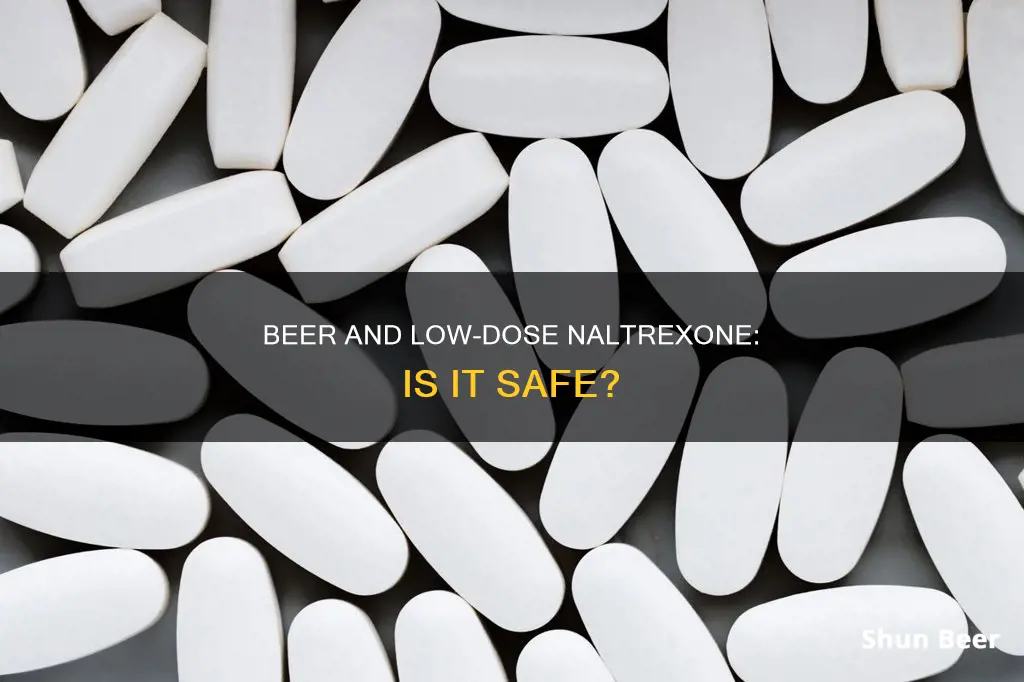
Naltrexone is a medication used to treat opioid and alcohol use disorders. It works by blocking the opioid and endorphin receptors in the body, reducing the pleasurable effects and feelings of intoxication from alcohol consumption. While it is possible to drink alcohol while taking low-dose naltrexone, the feel-good factor from alcohol is significantly reduced. Naltrexone does not prevent impairment from drinking, and it is important to refrain from activities such as driving or operating heavy machinery while under the influence of alcohol, even when taking naltrexone. It is always advisable to keep alcohol consumption to a minimum when taking any medication.
| Characteristics | Values |
|---|---|
| Drinking alcohol while on low-dose naltrexone | Possible but not advisable |
| Effect of low-dose naltrexone on alcohol intoxication | Blocks the euphoric effects and feelings of intoxication (the "buzz") from alcohol |
| Effect of low-dose naltrexone on alcohol impairment | Does not prevent impairment, reduced coordination or reflexes, or poor judgment |
| Risk associated with drinking alcohol while on low-dose naltrexone | Increased risk of overdose due to higher alcohol consumption to achieve the desired effect |
| Precautions when drinking alcohol while on low-dose naltrexone | Avoid binge drinking, ensure a safe group of people are present, and have a designated driver |
What You'll Learn
- Naltrexone blocks the 'feel-good' factor from alcohol, reducing the enjoyment of drinking
- You can still get drunk on naltrexone, and experience hangovers and impaired coordination or judgement
- Naltrexone does not prevent you from becoming impaired while drinking alcohol, so you should not perform activities such as driving under the influence
- Naltrexone is not addictive or psychoactive, and will not cause a high or withdrawal symptoms when you stop taking it
- Naltrexone is usually well-tolerated, with mild side effects such as fatigue, trouble sleeping, and reduced motivation to drink alcohol

Naltrexone blocks the 'feel-good' factor from alcohol, reducing the enjoyment of drinking
Naltrexone is a medication used to treat opioid and alcohol use disorders. It works by blocking the opioid and endorphin receptors in the body, reducing the pleasurable effects of drinking alcohol. This helps to decrease cravings for alcohol and can aid in reducing alcohol consumption or quitting altogether.
When taken with alcohol, naltrexone blocks the euphoric effects and feelings of intoxication (the "buzz") from alcohol. It suppresses the release of endorphins, which are responsible for the feel-good factor associated with alcohol consumption. This means that drinking alcohol while on naltrexone will not produce the same pleasurable sensations. The alcohol may feel less interesting or unappealing, reducing the motivation to drink.
The effect of naltrexone on alcohol consumption is so significant that a pharmaceutical preparation mimicking its effects, called Nalmefene, has been developed. This medication helps reduce the amount of alcohol consumed by individuals and is available by prescription.
It is important to note that while naltrexone reduces the enjoyment of drinking, it does not prevent impairment while drinking alcohol. Individuals may still experience reduced coordination, poor judgment, and other physical effects of alcohol even when taking naltrexone. Therefore, it is not advisable to drive or perform other activities that require coordination and focus while drinking alcohol, even when taking naltrexone.
Additionally, it is recommended to consult a doctor before starting naltrexone treatment, especially if there is a history of liver disease or opioid medication use. Abruptly beginning naltrexone while still on opioids can lead to withdrawal symptoms, including muscle aches and twitches.
Beer and Guns: Can You Drink and Carry?
You may want to see also

You can still get drunk on naltrexone, and experience hangovers and impaired coordination or judgement
Naltrexone is a medication used to treat opioid and alcohol use disorders. It works by blocking the opioid and endorphin receptors in the body, reducing the cravings for substances such as opioids and alcohol. It is available in two forms: a 380 mg intramuscular injection (brand name: Vivitrol) and an oral tablet, usually taken once daily.
While naltrexone blocks the euphoric effects and feelings of intoxication from alcohol, it does not prevent impairment. This means that you can still get drunk on naltrexone and experience hangovers, impaired coordination, reduced reflexes, and poor judgment. It is important to take safety precautions when consuming alcohol while on naltrexone, such as not driving or operating heavy machinery.
The effect of naltrexone on alcohol consumption is due to its ability to block the opiate receptor and thereby reduce the "feel-good factor" associated with alcohol consumption. This makes drinking less enjoyable, which can help reduce alcohol intake over time. However, it is still possible to drink alcohol while taking naltrexone, and some people may even ingest increased quantities of alcohol to achieve the desired effect, increasing the risk of overdose.
When taking any medication, including naltrexone, it is generally advisable to keep alcohol consumption to a minimum. If you are taking naltrexone, it is recommended to limit yourself to a small glass of wine with a meal, for example. It is also important to note that you should not be actively drinking at the time you start naltrexone treatment for alcohol use disorder.
In summary, while naltrexone can be effective in reducing cravings and heavy drinking, it is important to understand that it does not prevent the physical effects of alcohol. You can still get drunk and experience hangovers and impaired coordination or judgment. Therefore, it is crucial to take the necessary safety precautions when consuming alcohol while on naltrexone treatment.
Krusteaz Buttermilk: The Perfect Beer Batter Base?
You may want to see also

Naltrexone does not prevent you from becoming impaired while drinking alcohol, so you should not perform activities such as driving under the influence
Naltrexone is a medication used to treat opioid and alcohol use disorders. It is available as a long-acting intramuscular injection or an oral tablet. The medication works by blocking the opioid and endorphin receptors in the body, reducing the pleasurable effects and feelings of intoxication from alcohol consumption. This helps individuals with alcohol use disorder to decrease their cravings and drinking behaviours over time.
While naltrexone can reduce the euphoric effects of alcohol, it is important to note that it does not prevent impairment while drinking. Naltrexone will not improve coordination, reflexes, or judgement that may be compromised due to alcohol consumption. Therefore, it is crucial to refrain from activities that require alertness and coordination, such as driving, even when taking naltrexone.
The impairment caused by alcohol consumption while on naltrexone can still lead to dangerous situations. For example, an individual may experience a loss of motor coordination, decreased response time, and slowed rates of thinking, which can increase the risk of accidents, especially when performing tasks that require quick reflexes and concentration.
Additionally, combining naltrexone with alcohol can increase the risk of side effects. Naltrexone may cause dizziness and drowsiness, and consuming alcohol while taking this medication can enhance these side effects. It is important to understand how naltrexone affects the body and to use it as directed by a healthcare professional.
In summary, while naltrexone can help block the euphoric effects of alcohol, it does not prevent impairment. Therefore, individuals taking naltrexone should refrain from activities such as driving or operating heavy machinery while under the influence of alcohol to ensure their safety and the safety of others. It is always advisable to keep alcohol consumption to a minimum when taking any medication, including naltrexone.
Troubleshooting a Beer Siphon: What You Need to Know
You may want to see also

Naltrexone is not addictive or psychoactive, and will not cause a high or withdrawal symptoms when you stop taking it
Naltrexone is a medication that can be used to treat alcohol use disorder. It is not an opioid and is not addictive or psychoactive. This means that it will not give you a high, and you will not experience withdrawal symptoms when you stop taking it. Naltrexone is a pure opiate antagonist, which means it blocks opiate receptors in the body. It is typically taken as a tablet once daily or as a monthly injection.
When used in the treatment of alcohol use disorder, naltrexone blocks the euphoric effects and feelings of intoxication from alcohol. It reduces the "buzz" or "reward" that people typically experience from drinking, which can help them to drink less or quit drinking altogether. However, it is important to note that naltrexone does not prevent impairment while drinking alcohol. People taking naltrexone can still experience the physical effects of alcohol, such as reduced coordination, impaired judgment, and hangovers. Therefore, it is not recommended to drive or perform other activities that require coordination and focus while under the influence of alcohol, even when taking naltrexone.
Low-dose naltrexone (LDN) specifically refers to the use of naltrexone at lower doses, typically between 50 and 75 mg. At these doses, naltrexone can reduce the "feel-good factor" from alcohol, making it less enjoyable to drink. This effect can be beneficial for recovering alcoholics to prevent them from returning to drinking large amounts of alcohol.
In summary, naltrexone is a safe and effective medication for treating alcohol use disorder. It is not addictive or psychoactive and does not cause a high or withdrawal symptoms. However, it is important to use it as directed by a doctor and in conjunction with counseling or recovery coaching for the best results.
Antibiotics and Alcohol: Safe After 12 Hours?
You may want to see also

Naltrexone is usually well-tolerated, with mild side effects such as fatigue, trouble sleeping, and reduced motivation to drink alcohol
Naltrexone is a medication used to treat opioid and alcohol use disorders. It works by blocking the opioid and endorphin receptors in the body, reducing cravings for substances such as opioids and alcohol. It is available in two forms: a 380 mg intramuscular injection and an oral tablet with a typical dose of 25-100 mg.
Naltrexone is usually well-tolerated and has a low risk of mild side effects. Some people may experience fatigue, trouble sleeping, nausea, headaches, or somnolence as their body adjusts to the medication, but these side effects typically clear up within a week or so.
In addition to its effects on substance use disorders, low-dose naltrexone (LDN) is also being studied for its potential benefits in treating other conditions such as chronic fatigue syndrome, autoimmune diseases, and post-traumatic stress disorder (PTSD). When used in low doses, naltrexone works by triggering the release of 'feel-good' hormones in the brain, limiting the production of inflammatory chemicals, and regulating natural opioid production.
It is important to note that while naltrexone can reduce cravings and blunt the enjoyable effects of alcohol, it does not prevent impairment from drinking. People taking naltrexone can still experience reduced coordination, poor judgment, and other physical effects of alcohol. Therefore, it is important to refrain from activities such as driving or operating heavy machinery after drinking alcohol, even when taking naltrexone.
Mixing Beer and Hard Liquor: Safe or Not?
You may want to see also
Frequently asked questions
Yes, it is possible to drink alcohol while taking low-dose naltrexone. However, it is always advisable to keep alcohol consumption to a minimum when taking any medication.
Yes, you can still get drunk on low-dose naltrexone and experience the negative impacts of being drunk such as impaired coordination and judgment, as well as hangovers.
Naltrexone blocks the euphoric effects and feelings of intoxication from alcohol. This means that you may drink more alcohol to try and achieve the same effect, increasing the risk of overdose.
Low-dose naltrexone is used to treat opioid and alcohol use disorders. It works by blocking opioid and endorphin receptors in the body, reducing cravings for substances such as opioids and alcohol.
Low-dose naltrexone has a low risk of side effects, and most are mild and subside on their own. However, some people may experience nausea, headaches, or fatigue as they adjust to the medication.


